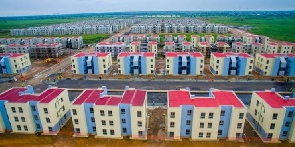The 2012 Presidential Candidate of the New Patriotic Party, Nana Akufo-Addo, has stated that the current Petroleum Revenue Management Bill before Parliament is replete with clauses that need to be reviewed carefully to avoid traces of possible pitfalls embedded in them so that Ghana can completely stave off the slippery slope towards making the discovery of oil a curse.
In the speech, titled “The Economic Prospects of the Oil Discovery to the Nation”, Nana Akufo-Addo stated that the primary development objective for the Ghanaian economy must be a single-minded focus on its structural transformation by shifting focus from what he described as the “Guggisberg economy”, that is a raw material producing and exporting economy, to a transformed economy that is based on the production of value-added goods backed by knowledge and technology-driven service industries.
Such transformation, he said, must be supported by an educated and healthy labour force and a first class network of infrastructure and thus saw the oil discovery as yet another resource that will support this industrial transformation effort.
Nana Akufo-Addo said the economic importance of the oil find is that it must help in such a structural transformation and get us to move away from the production of yet another raw material – oil. This, according to him, is the only way Ghana can win the war on poverty and provide the broad masses of the people with decent and dignified standard of living.
He therefore stressed the need to put in place prudent management processes and a regulatory environment to ensure that the positive outcomes are maximized and the negative impacts mitigated.
Nana Akufo-Addo stated that some clauses embedded within the current Petroleum Revenue Management Bill, which is to provide a strong framework for the collection and management of Ghana's expected petroleum revenues, needed to be reviewed so the discovery of oil does not become a curse.
He cited Clause 19 of the Bill which states that beginning from the year 2011, the Annual Budget Funding Amount from petroleum revenues shall be set within the range of 50 to 70 percent of the benchmark revenue. It also states that the exact percentage of the benchmark revenue allocated for spending shall be approved by Parliament as part of the national budgetary process.
He noted that the budget process for 2011 begun earlier in the year and with about one month left for the budget to be read, the major components of the statement including the revenue forecast and the percentage of the benchmark revenue to be spent have been decided upon by government.
However, the law that ostensibly governs the disbursement of the revenue is yet to be debated and passed in the House.
The content of the draft bill, he said, will inform the allocation of the oil revenue that will accrue in 2011.
This means that the exact proportion of the oil revenues to support the budget and how the amount should be allocated have been done well ahead of the law that is expected to govern the process. The percentage of the benchmark revenue that will be allocated for spending in 2011, according to him, have already been embodied in the 2011 budget statement which will be presented to Parliament in November 2010.
“In order to give the impression that the allocation is governed by law, the majority leadership in Parliament will have to rush the bill through the House with little time for debate. This will mean that the people of Ghana and their elected representatives will not be given the chance to debate effectively and indeed understand the law that will govern the utilization of the oil revenues. The speed at which this bill will be passed with little due diligence will undermine the need for transparency in the choice of a revenue management model”, he said.
Nana Akufo-Addo further went on to cite Clause 22 of the bill, which prescribes how the annual budget funding amount should be utilised. The bill states that the revenue, its use and expenditure must be part of the national budget and subjected to the same budgetary process that are necessary to ensure the efficient allocation and monitoring of its use.
The clause also lists about 11 sectors of the economy where the resources should be spent mostly. This part of the bill, he said, is what is likely to put Ghana in trouble.
Up to 70% of the oil revenue will be put into the consolidated fund and its use left in the hands of bureaucrats and politicians. Considering how Ghana’s budget is drawn, it will be treated as usual government revenue used for public investment and other expenditures. It may even be used when things get tight for recurrent expenditure. Thus the resource may likely be dissipated without much attention to the finite and non-renewable nature of oil.
Furthermore, the eleven sectors identified to be given priority in funding, according to Nana Akufo-Addo, are too many and will result in spreading the revenue thinly and without any appreciable positive impact on the economy symptomatic of our regular appropriation process.
Nana Akufo-Addo said for Ghana to maximise the benefits and minimise the woes of this discovery, we have to continue to fortify the cocoa industry and encourage the exploration, production, and value addition to the traditional non-oil minerals such as gold, diamonds, and bauxite as the agricultural and non-oil mineral wealth of this nation will for a long time continue to be the backbone of our economy.
As such the resources from the oil discovery should not be used for frivolous investments but for investments that will take cognizance of the finite nature of oil and gas to ensure that when the wells dry up a new industry can help sustain the economy.
He said Ghana must take a cue from what is going on in the Arab world where the Emirates, for instance, are using their oil revenues to create competitive advantages in the Airline industry and in tourism.
According to Nana Akufo-Addo, for Ghana to succeed in the industrial transformation we have to pay attention to education, health, and infrastructure development and as such the oil revenue should be kept in a separate account at the Bank of Ghana and not to be used for general budget support. That will be the best way of preventing corruption and unfocussed use of the oil revenue.
Nana Akufo-Addo prescribed the creation of up to four separate special purpose funds which will draw from this separate account at the Bank of Ghana. These special purpose funds are The Education Fund, The Health Fund, The Infrastructure Fund, and The Industrialization Fund.
The purpose of the Industrialization Fund should be for the structural transformation of our economy. This will be used to increase access to capital at a cost that is affordable to local businesses to facilitate the establishment of light industries. The Infrastructure Fund should be used to provide the necessary infrastructure in roads, railways, waterways, energy, and water to facilitate our efforts towards the industrial transformation.
The Education Fund should be used to provide quality education and train our people at affordable costs while the Health Fund should be used to provide quality and affordable health care for our people. The Health and Education Funds are necessary for the full development of our human capital to support our industrialization efforts.
These were contained in a speech delivered on his behalf by Prof. Gyan Baffour at the 39th Faculty Week Celebration of Faculty of Social Sciences of the Kwame Nkrumah University of Science and Technology on Wednesday, October 6 2010.
General News of Sunday, 10 October 2010
Source: Akuffo Addo Campaign
Review clauses in Petroleum Revenue Mgt. Bill - Nana Addo

















